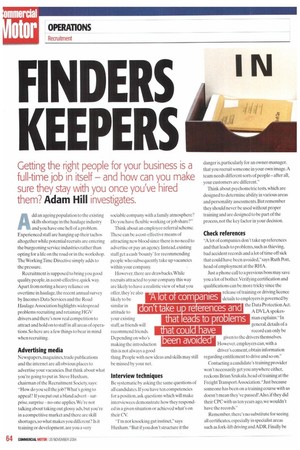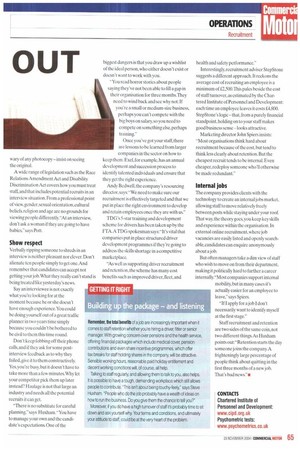FINDERS IN
Page 64

Page 65

If you've noticed an error in this article please click here to report it so we can fix it.
KEEPERS
Getting the right people for your business is a full-time job in itself — and how can you make sure they stay with you once you've hired
them? Adam Hill investigates.
Add an ageing population to the existing skills shortage in the haulage industry and you have one hell of a problem. Experienced staff are hanging up their tachos altogether while potential recruits are entering the burgeoning service industries rather than opting for a life on the road or in the workshop. The Working Time Directive simply adds to the pressure.
Recruitment is supposed to bring you good quality people. in a cost-effective, quick way. Apart from noting a heavy reliance on overtime ill haulage. the recent annual survey by Incomes Data Services and the Road Haulage Association highlights widespread problems recruiting and retaining HGV drivers and there's now real competition to attract and hold on to staff in all areas of operations. So here are a few things to bear in mind when recruiting.
Advertising media
Newspapers, magazines, trade publications and the internet are all obvious places to advertise your vacancies. But think about what you're going to put in. Steve Huxham, chairman of the Recruitment Society. says: "How do you sell the job? What's going to appeal? If you put out a bland advert —surprise. surprise —no-one applies. We're not talking about taking out glossy ads, but you're in a competitive market and there are skill shortages, so what makes you different? Is it training or development, are you a very sociable company with a family atmosphere? Do you have flexible working or job share?"
Think about an employee referral scheme. These can be a cost-effective means of attracting new blood since there is no need to advertise or pay an agency. Instead, existing staff get a cash 'bounty' for recommending people who subsequently take up vacancies within your company.
However, there are drawbacks.While recruits attracted to your company this way are likely to have a realistic view of what you offer, they're also likely to be similar in attitude to your existing staff, as friends will recommend friends. Depending on who's making the introduction this is not always a good thing. People with new ideas and skills may still be missed by your net.
Interview techniques
Be systematic by asking the same questions of all candidates. If you have ten competencies for a position, ask questions which will make interviewees demonstrate how they responded in a given situation or achieved what's on their CV.
"I'm not knocking gut instinct," says Huxham."But if you don't structure it the danger is, particularly for an owner-manager, that you recruit someone in your own image.A team needs different sorts of people — after all, your customers are different."
Think about psychometric tests. which are designed to determine ability in various areas and personality assessments. But remember they should never be used without proper training and are designed to be part of the process, not the key factor in your decision.
Check references
"A lot of companies don't take up references and that leads to problems,such as thieving, bad accident records and a lot of time off sick that could have been avoided," says Ruth Pott, head of employment at the RHA.
Just a phone call to a previous boss may save you a lot of bother. Verifying certification and qualifications can be more tricky since the release of training or driving licence details to employers is governed by the Data Protection Act. A DVLA spokesman explains:1n general, details of a record can only be given to the drivers themselves. However, employers can, with a driver's consent, obtain information regarding entitlement to drive and so on."
Contacting a candidate's training provider won't necessarily get you anywhere either, reckons Brian Szukala, head of training at the Freight Transport Association."Just because someone has been on a training course with us doesn't mean they've passed Also, if they did their CPC with us ten years ago, we wouldn't have the records."
Remember, there's no substitute for seeing all certificates, especially in specialist areas such as fork-lift driving and ADR. Finally be wary of any photocopy insist on seeing the original.
A wide range of legislation such as the Race Relations Amendment Act and Disability Discrimination Act covers how you must treat staff, and that includes potential recruits in an interview situation. From a professional point of view, gender, sexual orientation, cultural beliefs, religion and age are no grounds for viewing people differently. "At an interview, don't ask a woman if they are going to have babies," says Pott.
Show respect
Verbally ripping someone to shreds in an interview is neither pleasant nor clever. Don't alienate ten people simply to get one.And remember that candidates can accept not getting yourjob.What they really can't stand is being treated like yesterday's news.
Say an interviewee is not exactly what you're looking for at the moment because he or she doesn't have enough experience.You could be doing yourself out of a great traffic planner in two years time simply because you couldn't be bothered to be civil to them this time round.
Don't keep fobbing off their phone calls, and if they ask for some postinterview feedback as to why they failed, give it to them constructively. Yes, you're busy, but it doesn't have to take more than a few minutes.Why let your competitor pick them up later instead? Haulage is not that large an industry and needs all the potential recruits it can get.
"There is no substitute for careful planning," says Huxham."You have to manage your own and the candidate's expectations. One of the biggest dangers is that you draw up a wishlist of the ideal person, who either doesn't exist or doesn't want to work with you.
"You read horror stories about people saying they've not been able to fill a gap in their organisation for three months.They need to wind back and see why not. If you're a small or medium-size business, perhaps you can't compete with the big boys on salary, so you need to compete on something else, perhaps training."
Once you've got your staff, there are lessons to be learned from larger companies in the sector on how to keep them. Exel, for example, has an annual development and succession process to identify talented individuals and ensure that they get the right experience.
Andy Bedwell, the company's resourcing director, says: "We need to make sure our recruitment is effectively targeted and that we put in place the right environment to develop and retain employees once they are with us."
TDG's 5-star training and development scheme for drivers has been taken up by the FTA. A TDG spokesman says:-It's vital that companies put in place structured driver development programmes if they're going to address the skills shortage in a competitive marketplace.
-As well as supporting driver recruitment and retention, the scheme has many cost benel its such as improved driver, fleet, and health and safety performance."
Interestingly, recruitment adviser StepStone suggests a different approach. It reckons the average cost of recruiting an employee is a minimum of £2,500.This pales beside the cost of staff turnover, as estimated by the Chartered Institute of Personnel and Development: each time an employee leaves it costs £4,800. StepStone's logic that, from a purely financial standpoint, holding on to your staff makes good business sense looks attractive.
Marketing director John Spiers insists: "Most organisations think hard about recruitment because of the cost, but tend to think less clearly about retention. But the cheapest recruit tends to be internal. Even cheaper, redeploy someone who'll otherwise be made redundant."
Internal jobs
The company provides clients with the technology to create an internal jobs market, allowing staff to move relatively freely between posts while staying under your roof That way, the theory goes, you keep key skills and experience within the organisation. In external online recruitment, where job vacancies are easily listed and openly searchable, candidates can enquire anonymously about a job.
But often managers take a dim view of staff who wish to move on from their department, making it politically hard to further a career internally. "Most companies support internal mobility, but in many cases it's actually easier for an employee to leave," says Spiers.
"If I apply for a job I don't necessarily want to identify myself at the first stage."
Staff recruitment and retention are two sides of the same coin, not two different things. As Huxham points out: "Retention starts the day someone joins the company.A frighteningly large percentage of people think about quitting in the first three months of a new job. That's bad news."•
























































































































































































